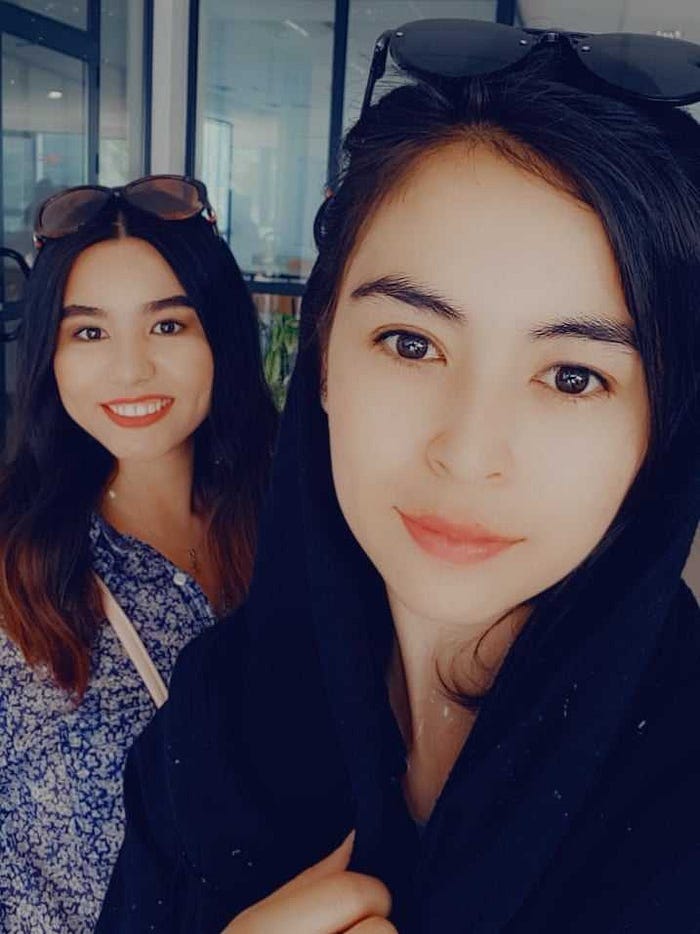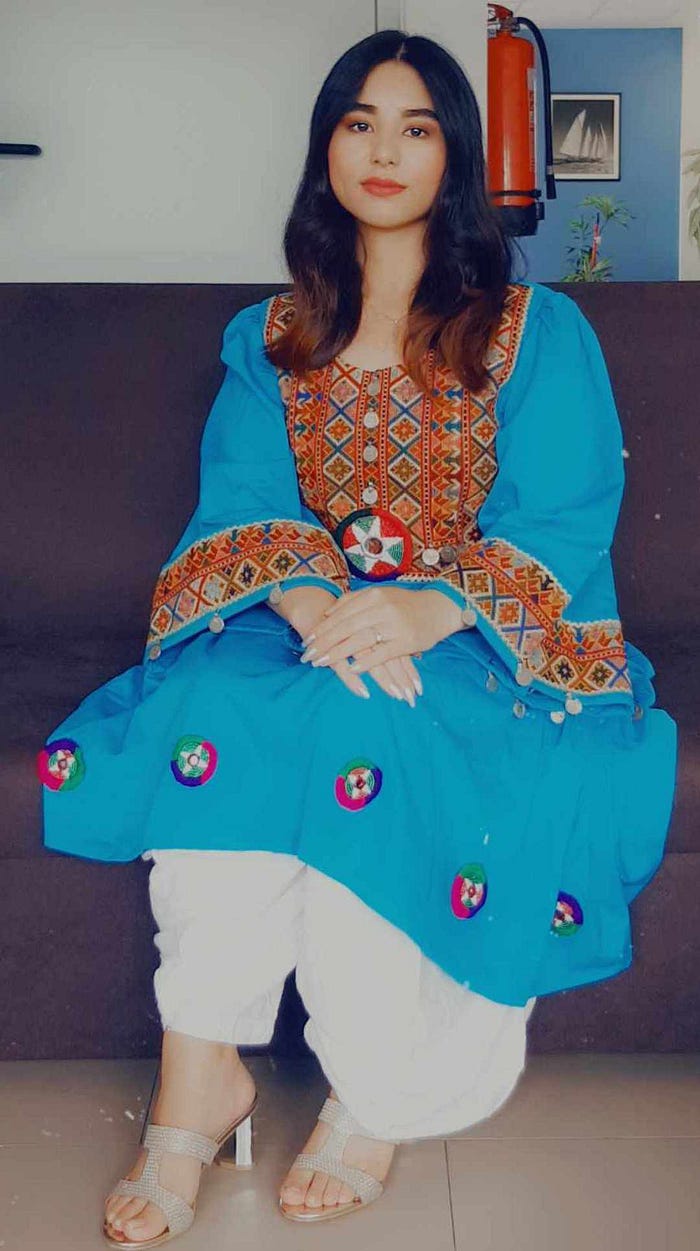Being a refugee is not an easy thing. It’s not a choice. It’s not an option. One thing that really bothers our minds is whether we would stay in Bulgaria forever — which country would be our home?
The uncertainty and the lack of ability to see their family members are two of the major difficulties that Fatema Husseini and Shaima Rezaie have experienced recently.
Originally from Ghazni but having grown up in Kabul, the capital of Aghanistan, Fatema shares, “I really want to be optimistic about everything here [in Bulgaria] but it is a little bit difficult for me because of the environment, the culture, the gestures, and the way in which the people in this town [Blagoevgrad] say YES and NO.”
If I have to go back to the past — from where I have started, I have passed through many, many difficulties. So, I think it’s an achievement that I’m here now.
Before coming to Bulgaria, Fatema had lived in Iran for six months to get her visa. However, her family is still in Aghanistan. Fatema has three brothers who are younger than her. Fatema’s mother used to work as a Math teacher but after the Taliban took over the country, she became a housewife.
One thing that I cannot get out of my mind is when I am going to see my parents again. This is the main problem I have. I believe that I can solve all the other issues that I might encounter in Bulgaria.
“Unluckily or fortunately, I don’t have a sister because in Aghanistan girls are not allowed to study,” Fatema says.

If I had a sister, she would be at home and at the age of 14 or 15 she would be getting married.
Born on March 1, 2001, Fatema shares that it is not compulsory to learn English in Aghanistan. “English is a business language. I have decided to study this language and I have found an organization — Afghanistan Relief Organization (ARO) — funded by the US Embassy in Afghanistan. It [the organization] helps students at the age of 13–15 to improve their English and computer skills,” Fatema reveals. Additionally, the Afghan girl shares that when she studied there, she actively used that knowledge.
I was teaching what I had learned.
The 22-year old Afghan girl says that most of her classmates are now in Kyrgyzstan and Bishkek where there are plenty of American universities.
I’ve always wanted to study in an American university in Europe or in an American University in the USA. I didn’t know what it would be like in Bulgaria but now I am really happy because the university [AUBG] is really good.
Fatema shares that the teachers at the English Language Institute (ELI) are kind. “They spend a lot of their energy while being with us ; what is more, they even go out of their ways to help us,” Fatema adds.

“The person that I want to be but I cannot be makes me feel sad,” Fatema reveals. She shares that she just has to accept the current situation as it is. After all, Fatema remains optimistic. Fatema reveals that she prefers to call her failures better options and opportunities.
Almost nothing can scare me. Maybe I have lost my feelings. I am afraid of losing my family and friends. […] Our country [Afghanistan] needs educated girls.
Going back to her memories from Afghanistan, Fatema reveals that she felt protected when she went a place named Bagh Babur [the Garden of Women]. Fatema shares that compared to her hometown, Blagoevgrad is a small town. “When [in Blagoevgrad], I feel relaxed,” she says.
I was stronger and more confident when I was in Afghanistan. When I came to Blagoevgrad, I realized what stress is.
Being independent both financially and mentally as well as being successful are two of my biggest dreams. Hopefully, I would be working in five years. I have some great things on my mind and I’m sure I will achieve them after I graduate from AUBG.
Fatema shares that the first meeting with the other Afghan girl studying at ELI is unforgettable. They had never seen each other before coming to Blagoevgrad. “When I saw Shaima, I hugged and welcomed her,” Fatema says.

Shaima and I are the luckiest girls because we are here [at ELI]. In Afghanistan there are thousands of girls that cannot continue their education.
Coming from Kabul where she lived for 20 years, Shaima shares, “When I was in Afghanistan, I dreamed about going abroad and studying there.”
When the Taliban came, my sister and I moved to Pakistan. We wanted to go to the USA. We applied to a university in Bulgaria [AUBG] and an academy in Italy. Then I received a confirmation from AUBG and I decided to come here and improve my English.
When Shaima arrived in Blagoevgrad on October 5, 2022, she was confused about the languages spoken in town (i.e. English and Bulgarian) because she didn’t understand them. These days it is easier for her because she can already speak English.
When I came to Blagoevgrad, I felt alone. When I want to hug my family members, I realize that I cannot do this. The only option is to chat with them on social media. After a call them, I cry. It is really difficult for me to stay alone and I just try to be strong. I cannot forget my family.
The majority of Shaima’s closest people are still in Kabul, Afghanistan. The 22-year-old Afghan girl shares that she has a biological mother, a step mother, three brothers and five sisters.
In Afghanistan Shaima had to do whatever her mother told her. For instance, she had to go to bed at a certain time. In addition to that when she was in her home country, she had to go to wedding and birthday parties numerous times per month.
When I do something [in Bulgaria] that I wasn’t previously allowed to do [back in Afghanistan], I feel happy.

An hour away from the place where Shaima lived in Afghanistan, there is an area called Band Qargha. This was her favorite place to go to because there she could go to picnics with her family and friends.
In Blagoevgrad I love the Bachinovo park because there is a lake and a green area. When I walk around it [the lake], I just start feeling happy.
In her spare time Shaima likes listening to music, dancing, and playing games on her phone. Her favorite colors are white, black and red.
When I wear white, I feel very strong. It [wearing white] gives me energy. I wear black clothes when I feel sad and depressed. When I am really happy, I just wear clothes in red.
I want to become an AUBG student, graduate from it and find a job. Then I will be able to help my family members.
Shaima concludes that her biggest dream is to go to the USA because her sister is there together with a few other family members. “There [in the USA] I won’t feel alone,” Shaima reveals.






